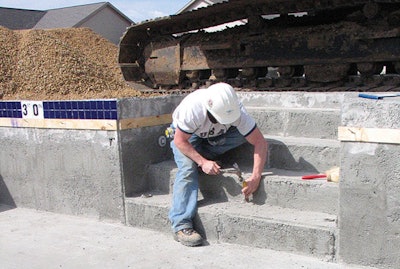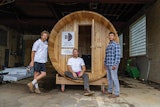
Of the issues impacting the pool and spa construction industry, underground labor remains at the top of the list. Here, AQUA's Senior Editor, Eric Herman, takes a look at the fight against the underground economy with an eye toward measures that could potentially stem the tide of unlawful labor practices.
Although it's comforting to think the "Great Recession" is now firmly in the past, one of its primary ripple effects is still very much with us. The underground labor market — a cancerous problem that has long plagued sweat-intensive industries — ballooned during the recession as contractors sought competitive edges in shrinking markets while laborers seized any means available to make a living.
Despite today's upward economic trajectory, those trends show no signs of slowing. While estimates may vary, there is no question the underground economy remains massive in size and far-reaching in consequence. Throughout the U.S., the pool construction and service industry consistently ranks right beside landscaping, roofing, tree trimming and HVAC as the industries most affected by underground labor.
FIFTY SHADES OF PAY
Although underground labor is a national problem, California remains its biggest market, and perhaps a bellwether for change. According to those fighting the battle in the Golden State, unreported income takes on a number of forms. Some employers falsely claim they use only independent contractors to dodge workman's compensation insurance and payroll taxes. Others falsify wages or cheat employees on overtime, while still others use undocumented workers who are paid entirely under the table.
"The greatest impact is felt in the more labor intensive businesses," explains Alan Smith, president of Alan Smith Pool Plastering and Remodeling in Orange, Calif. "In the pool industry that means plasterers, masons, tile-setters, plumbers and others. Underground labor creates an inequity in the market and artificially deflates the price of labor."
Smith, who has combated underground labor for two decades now, reports that his competitors who pay cash only or otherwise cheat the system can underbid aboveboard contractors by 20 percent or more. "It makes competing extremely difficult because we're not on a level playing field," he says. "You work harder for less profit, and as a result there is virtually no room for error. It's a terrible situation."
According to John Norwood, president and chief lobbyist for the California Swimming Pool and Spa Association, the organization fighting the industry's battle in the state: "The problem is not only undercutting legitimate contractors who are trying to play by the rules and stay in business, but it's exposing homeowners to unlimited liability.
"Unfortunately," he adds, "the problem is so widespread that no one has the resources to physically chase people down in their trucks; we have to find a better and smarter way to enforce the law."
A NEW HOPE
That search for a "smarter way" may have reached a milestone on March 9 when California's Little Hoover Commission, a government task force established in 1962 to promote economic prosperity and fairness, issued a sweeping report and recommendations titled, "Level the Playing Field: Put California's Underground Economy Out of Business."
In the executive summary, the report's authors paint a grim picture: "The Commission learned that many cheaters break the rules because getting caught is unlikely. If they are caught, few are charged in court. When found guilty, the profits from cheating often outweigh the fines and penalties. More, there is an abysmal record of collecting restitution, as the cheaters hide assets to avoid paying anything at all and quickly set up shop again under new ownership. Unfortunately, for some, cheating is business as usual."
Smith describes the problem in even more succinct terms: "As it stands," he says, "the system is designed to fail."
In response to the issue, the commission issues a registry of detailed recommendations aimed at enhancing enforcement efforts. Chief among those measures is a call for coordinated efforts amongst key agencies involved in labor issues. The ability to crosscheck databases, for example, would make it easier to identify targets for investigation and possible sanctions, including criminal prosecution.
The commission also recommends a "bright line" in defining who is and isn't an independent contractor, an ambiguity that has long been viewed as central to the overall problem. Other measures include expanding property seizure laws and a three-pronged educational program for consumers, public employees and businesses and their workers.
For his part, Norwood sees the commission's report as a positive step that could prove effective if implemented: "If we have all these data banks and we merge those data banks together," he explains, "we should be able to find targets electronically, i.e. if you're a contractor and reported to the Employment Development Department that you have employees, but then we crosscheck with Contractor State License Board and you report that you don't have worker's comp insurance because you don't have employees, guess what? That becomes an indicator that you're not in compliance with the law."
Despite the seemingly intractable lure of easy money, activists along with concerned legislators and regulators have for years has been implementing various strategies with some success. This new set of recommendations now attempts to bring those measures together as one cohesive program.
"The past couple of years we've seen a number of task force stings between agencies," says Norwood. "The lead agency has been the Department of Insurance because they have a fraud task force and they also have the authority to put handcuffs on you if they find you're violating the law. We've also had various pieces of legislation that have given the Contractor State License Board and the Department of Consumer Affairs has additional authority to issue cease and desist orders to be able to go after people on licensing issues.
"Those are the kinds of things that have been going on; now this Little Hoover Commission report follows up on all of that and establishes oversight and coordination between agencies," he says. "Traditionally there have been all these blockades between agencies sharing information. This report says knock down all of those obstacles and create a plan and work together."
REGULATION CONSTERNATION
The commission also acknowledges that the patchwork of laws governing labor practices are often vague and confusing, making it difficult for aboveboard companies to comply with the law and at the same prompting others to simply seek ways to cheat the system.
According to the report: "The Commission also found laws and rules that can be so confusing and inconsistent that even those business owners who try to be compliant sometimes find they are not, while providing cover for those who intentionally cheat. The lack of clarity in the definition of independent contractor, for example, is one way that participants in the underground economy shroud themselves in legitimacy."
Whether or not the approach outlined by the Little Hoover Commission will gain traction and make inroads into the massive underground labor market remains to be seen.
"It's a situation where government is advising government," observes Smith. "Historically, that doesn't necessarily result in any kind of improvement and has the potential of even making things worse. We'll have to wait and see."
Norwood is more guardedly optimistic, "It's a huge problem and it's unlikely we'll ever see it completely eradicated. But it's to everyone's advantage to do what we can to enforce the law and reduce the number of people violating the law."
To read the full report from the Little Hoover Commission go to bit.ly/littlehoover.
Comments or thoughts on this article? Please e-mail [email protected].












































